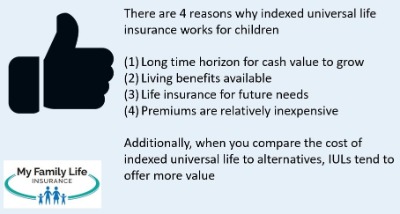All Categories
Featured
Table of Contents
Do they compare the IUL to something like the Vanguard Total Amount Supply Market Fund Admiral Shares with no tons, a cost ratio (EMERGENCY ROOM) of 5 basis points, a turnover proportion of 4.3%, and an extraordinary tax-efficient record of distributions? No, they contrast it to some horrible proactively managed fund with an 8% tons, a 2% EMERGENCY ROOM, an 80% turnover proportion, and a dreadful record of short-term resources gain circulations.
Shared funds frequently make annual taxable circulations to fund proprietors, also when the value of their fund has decreased in value. Shared funds not just call for revenue coverage (and the resulting annual taxation) when the mutual fund is rising in worth, but can additionally impose revenue tax obligations in a year when the fund has actually decreased in value.
You can tax-manage the fund, gathering losses and gains in order to reduce taxed distributions to the capitalists, yet that isn't in some way going to change the reported return of the fund. The possession of shared funds might call for the common fund owner to pay approximated tax obligations (which is better whole life or universal life).

IULs are easy to place to ensure that, at the owner's fatality, the beneficiary is exempt to either earnings or inheritance tax. The same tax obligation decrease methods do not work nearly also with common funds. There are many, commonly pricey, tax obligation traps connected with the timed trading of common fund shares, traps that do not put on indexed life insurance policy.
Opportunities aren't really high that you're going to be subject to the AMT due to your mutual fund distributions if you aren't without them. The remainder of this one is half-truths at finest. For circumstances, while it holds true that there is no revenue tax obligation because of your heirs when they inherit the profits of your IUL plan, it is likewise real that there is no income tax due to your successors when they inherit a common fund in a taxed account from you.
Maximum Funded Insurance
There are much better means to prevent estate tax obligation concerns than buying financial investments with low returns. Shared funds might trigger revenue taxes of Social Protection advantages.

The development within the IUL is tax-deferred and might be taken as tax obligation complimentary earnings by means of loans. The plan proprietor (vs. the common fund supervisor) is in control of his or her reportable revenue, therefore enabling them to lower or perhaps remove the taxes of their Social Security benefits. This is wonderful.
Here's one more minimal problem. It's real if you purchase a shared fund for state $10 per share right before the circulation date, and it disperses a $0.50 circulation, you are after that going to owe tax obligations (probably 7-10 cents per share) although that you haven't yet had any type of gains.
In the end, it's really regarding the after-tax return, not just how much you pay in taxes. You're also probably going to have more money after paying those tax obligations. The record-keeping demands for owning mutual funds are dramatically much more complicated.
With an IUL, one's documents are kept by the insurance provider, duplicates of annual statements are mailed to the owner, and circulations (if any type of) are amounted to and reported at year end. This set is also type of silly. Of training course you need to maintain your tax obligation records in instance of an audit.
What Is The Difference Between Term And Universal Life Insurance
All you need to do is push the paper right into your tax obligation folder when it appears in the mail. Barely a factor to acquire life insurance policy. It resembles this individual has never ever bought a taxable account or something. Common funds are commonly component of a decedent's probated estate.
On top of that, they undergo the hold-ups and expenses of probate. The profits of the IUL policy, on the various other hand, is constantly a non-probate circulation that passes outside of probate directly to one's called beneficiaries, and is consequently not subject to one's posthumous lenders, undesirable public disclosure, or similar delays and prices.
Medicaid disqualification and lifetime earnings. An IUL can provide their owners with a stream of revenue for their entire life time, no matter of just how lengthy they live.

This is helpful when arranging one's affairs, and transforming possessions to income prior to a retirement home arrest. Common funds can not be converted in a comparable way, and are almost always thought about countable Medicaid possessions. This is one more stupid one supporting that bad individuals (you know, the ones who need Medicaid, a government program for the poor, to spend for their assisted living facility) need to use IUL rather of mutual funds.
Variable Universal Life Vs Indexed Universal Life
And life insurance policy looks awful when compared relatively versus a pension. Second, individuals who have money to get IUL over and beyond their retired life accounts are going to need to be dreadful at managing money in order to ever get Medicaid to pay for their assisted living home costs.
Chronic and incurable ailment cyclist. All plans will enable a proprietor's very easy access to money from their plan, usually forgoing any type of abandonment charges when such individuals suffer a severe disease, require at-home care, or come to be restricted to an assisted living home. Mutual funds do not provide a similar waiver when contingent deferred sales fees still use to a mutual fund account whose proprietor needs to sell some shares to money the prices of such a remain.
Iul Companies
You get to pay more for that advantage (motorcyclist) with an insurance coverage plan. What a fantastic offer! Indexed universal life insurance coverage offers death benefits to the beneficiaries of the IUL proprietors, and neither the owner neither the beneficiary can ever lose money due to a down market. Common funds provide no such assurances or fatality advantages of any kind.
Currently, ask on your own, do you really require or want a survivor benefit? I absolutely do not need one after I get to economic self-reliance. Do I want one? I intend if it were cheap enough. Obviously, it isn't economical. Usually, a buyer of life insurance policy pays for the true price of the life insurance advantage, plus the costs of the policy, plus the revenues of the insurance provider.
Best Universal Life
I'm not entirely certain why Mr. Morais tossed in the entire "you can not shed cash" once more right here as it was covered quite well in # 1. He just desired to repeat the finest marketing point for these points I intend. Once more, you do not lose small dollars, yet you can lose genuine bucks, as well as face significant chance price as a result of reduced returns.

An indexed universal life insurance coverage policy proprietor may exchange their plan for a totally various plan without causing income taxes. A common fund proprietor can stagnate funds from one mutual fund company to one more without offering his shares at the previous (hence activating a taxed occasion), and redeeming brand-new shares at the last, usually based on sales fees at both.
While it holds true that you can trade one insurance plan for an additional, the reason that people do this is that the initial one is such a terrible policy that also after getting a brand-new one and undergoing the very early, adverse return years, you'll still come out ahead. If they were offered the right policy the very first time, they should not have any kind of need to ever exchange it and go with the very early, adverse return years once more.
Latest Posts
Cost Of Universal Life Insurance
Equity Indexed Whole Life Insurance
Guaranteed Universal Life Insurance Quotes